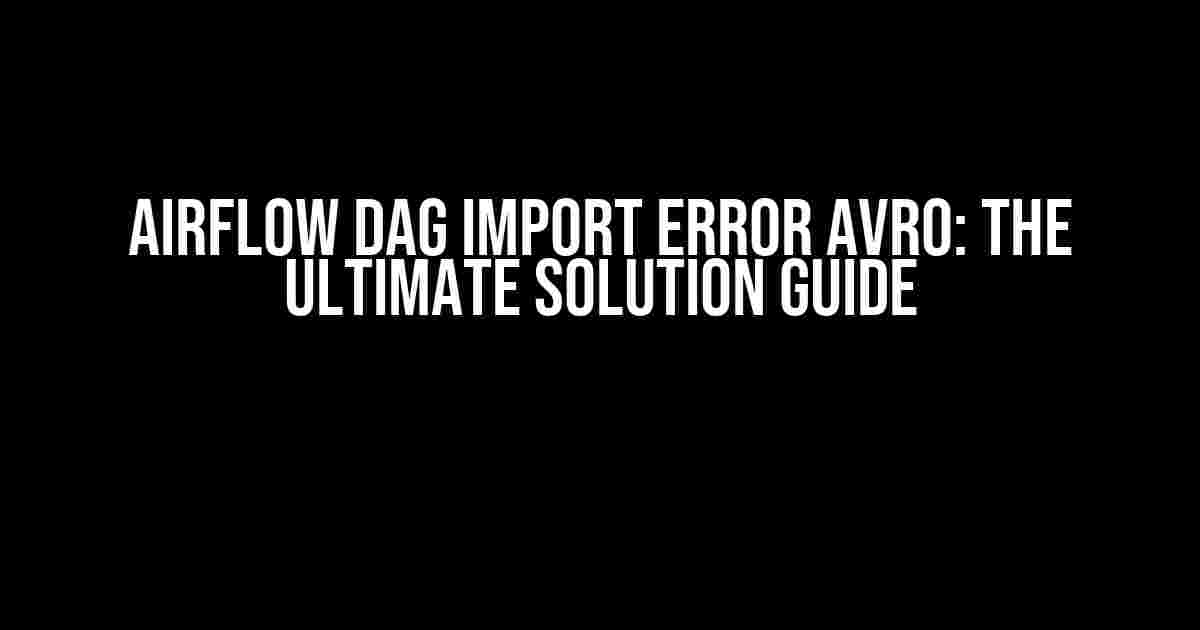Are you stuck with the frustrating “Airflow DAG import error Avro” issue? Don’t worry, you’re not alone! Many Airflow users have faced this problem, and today, we’re going to tackle it head-on. In this article, we’ll take you through a step-by-step guide to resolve this error and get your Airflow DAGs up and running smoothly.
What is the Airflow DAG Import Error Avro?
The “Airflow DAG import error Avro” occurs when Airflow is unable to import Avro dependencies in your DAG files. This error can be triggered due to various reasons, such as:
- Avro not installed in your Airflow environment
- Incorrect Avro version installed
- Avro dependencies not correctly configured
- DAG file syntax errors
Why do I get the Airflow DAG Import Error Avro?
Let’s dive deeper into the possible causes of this error:
1. Avro not installed in your Airflow environment
If Avro is not installed in your Airflow environment, you’ll encounter this error. Avro is a Apache library used for data serialization and deserialization, and it’s a crucial dependency for Airflow DAGs.
2. Incorrect Avro version installed
If you have an incorrect Avro version installed, it may not be compatible with your Airflow version, leading to the import error.
3. Avro dependencies not correctly configured
If Avro dependencies are not correctly configured, Airflow may not be able to import them, resulting in the error.
4. DAG file syntax errors
Syntax errors in your DAG file can also cause the import error. This can include issues with indentation, formatting, or incorrect use of Avro libraries.
How to Fix the Airflow DAG Import Error Avro?
Now that we’ve identified the possible causes, let’s move on to the solutions:
1. Install Avro in your Airflow environment
pip install avro
Run the above command in your terminal to install Avro. Make sure you’re in the correct environment where Airflow is installed.
2. Verify Avro version compatibility
Check the Avro version installed in your environment:
pip show avro
Verify that the installed Avro version is compatible with your Airflow version. You can check the Airflow documentation for compatible Avro versions.
3. Configure Avro dependencies correctly
Ensure that Avro dependencies are correctly configured in your DAG file. Here’s an example:
from airflow import DAG
from airflow.operators.bash_operator import BashOperator
from avro.schema import Parse
default_args = {
'owner': 'airflow',
'depends_on_past': False,
'start_date': datetime(2023, 3, 21),
'retries': 1,
'retry_delay': timedelta(minutes=5),
}
dag = DAG(
'avro_example',
default_args=default_args,
schedule_interval=timedelta(days=1),
)
t1 = BashOperator(
task_id='avro_task',
bash_command='avro-tools from-json --schema-file myfile.avsc myfile.json'
)
dag.append(t1)
In this example, we’re importing Avro dependencies correctly and using them in the DAG file.
4. Check DAG file syntax
Review your DAG file for syntax errors. Check for issues with indentation, formatting, and incorrect use of Avro libraries.
Troubleshooting Tips
If you’re still facing issues, here are some troubleshooting tips:
- Check the Airflow logs for more detailed error messages.
- Verify that Avro is installed in the correct environment.
- Try reinstalling Avro and its dependencies.
- Check for compatibility issues with other Airflow dependencies.
Conclusion
That’s it! By following these steps, you should be able to resolve the “Airflow DAG import error Avro” and get your DAGs up and running smoothly. Remember to install Avro correctly, verify version compatibility, configure Avro dependencies correctly, and check for DAG file syntax errors.
If you’re still facing issues, feel free to reach out to the Airflow community for further assistance.
| -error | Solution |
|---|---|
| Avro not installed | Install Avro using pip |
| Incorrect Avro version | Verify Avro version compatibility with Airflow |
| Avro dependencies not configured correctly | Configure Avro dependencies correctly in DAG file |
| DAG file syntax errors | Check DAG file for syntax errors and correct them |
This comprehensive guide should help you resolve the “Airflow DAG import error Avro” and get your DAGs running smoothly. Good luck!
Frequently Asked Question
Stuck with Airflow DAG import errors related to Avro? Don’t worry, we’ve got you covered!
Q1: Why am I getting an import error for Avro in my Airflow DAG despite having it installed?
This is likely due to a mismatch between the Python version used by Airflow and the version used to install Avro. Make sure to install Avro using the same Python version that Airflow is using.
Q2: I’ve installed Avro using pip, but I’m still getting an import error. What’s going on?
Double-check that you’ve installed Avro using the correct pip version (e.g., `pip3` or `pip2`) that matches the Python version used by Airflow. Also, ensure that Avro is installed in the correct environment (e.g., virtual environment) where Airflow is running.
Q3: How do I verify that Avro is correctly installed and available for Airflow?
You can test Avro installation by running `python -c “import avro”` in your terminal. If Avro is installed correctly, this command should not raise any errors. Additionally, you can check the Airflow logs for any error messages related to Avro installation.
Q4: Can I use a different Avro version than the one installed system-wide?
Yes, you can install a different Avro version within a virtual environment or using a tool like `conda`. This allows you to isolate the Avro version used by Airflow from the system-wide installation.
Q5: What if I’m still stuck with the import error after trying all the above suggestions?
Time to dig deeper! Check the Airflow logs for any error messages related to Avro, and review your DAG code to ensure there are no syntax errors or version conflicts. You can also try reinstalling Avro or seeking help from the Airflow community or a DevOps expert.

